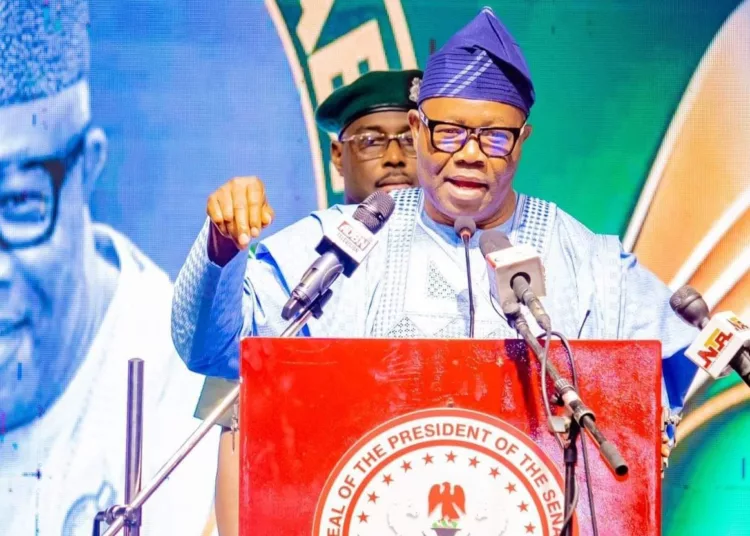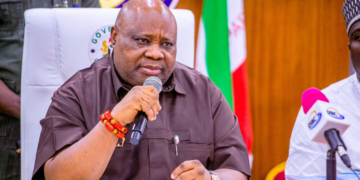The Senate President, Godswill Akpabio, said compliance with legislative resolutions by government ministries, departments, and agencies (MDAs) is not optional but binding.
Akpabio stated this at the 2nd National Workshop, organised by the Senate Committee on Legislative Compliance in Abuja, on the theme “Consolidating Strategies for Strengthening Legislative Compliance by MDAs.”
Akpabio, represented by the Senate Minority Whip, Senator Osita Ngwu, said, “It is a constitutional obligation owed by all arms and levels of government to the people of Nigeria.”
He said compliance with legislative resolutions was not optional but absolutely fundamental.
“Our laws, policies, and oversight functions are meant to guide the execution of government programmes to ensure transparency, equity, and effectiveness.
“When departments and agencies fail to comply with legislative directives, they undermine not just the authority of the legislature but the collective will of the Nigerian people we all represent.
“This speaks powerfully to the consequences of institutional neglect.
“When public institutions ignore legislative resolutions, when compliance becomes selective, and when oversight is treated with disdain, the result is a breakdown in trust.”
He added that the consequences would also include a rise in inefficiency and, ultimately, a disservice to the Nigerian people.
According to him, “Legislative compliance is not a hindrance to effective executive performance. It is a safeguard against abuse.
“As the president of the Senate, I give you full assurance that the National Assembly remains unwavering in its resolve to ensure that its resolutions are not only respected but also implemented.
“Where necessary, we shall employ the full weight of our constitutional powers to ensure and enforce compliance.
“The days of impunity must give way to the reign of institutional discipline. However, enforcement must be accompanied by engagement.
“We are not here to issue threats; we are here to build consensus. We are not here to antagonise agencies.
“We are here to strengthen institutions. We are not here to point fingers; we are here to point the way forward.”
Speaking at the event, the chairman of the Senate Committee on Legislative Compliance, Sen. Ede Dafinone, said:
“In recent times, we have witnessed several instances where MDAs and public institutions have either delayed or outrightly disregarded legislative resolutions passed by the Senate.”
According to him, these actions undermine the authority of the legislature and weaken the very foundation of our democratic institutions.
He said the workshop aimed to provide a platform for stakeholders to critically examine the root causes of non-compliance.
These according to him, include legal ambiguity, institutional rivalry, capacity gaps, and bureaucratic inertia.
He noted that the goal was to develop practical and enforceable solutions.
Dafinone urged MDAs to collectively work towards bridging the gap between legislation and execution for good governance, institutional effectiveness, and the benefit of the Nigerian people.
The Director of Fraud Risk Assessment, Prevention and Control, Mr Francis Usani, who represented the chairman of the EFCC, Mr Ola Olukoyede, commended the workshop’s initiators.
He said, “This workshop couldn’t have come at a better time—when we are witnessing increased instances of laws, policies, rules, and regulations being observed more in the breach than in compliance.”
He emphasised that by constitutional provision, the legislature is saddled with the responsibility of making laws for good governance and democracy.
He added that democracy can only be sustained where laws are made and obeyed.
“Compliance with resolutions made by the legislature is therefore critical to the sustenance of institutions. It is widely said that where there are no laws, there will be anarchy.
“And where laws are made but not complied with or implemented, there will also be anarchy,” he said.
He further stressed that “compliance with resolutions, laws, and policies made by the National Assembly is crucial to our collective existence as a people.”
He said the workshop was essential for Nigeria’s continued unity and democratic strength and expressed hope that it would enhance the compliance culture of MDAs with legislative resolutions.





